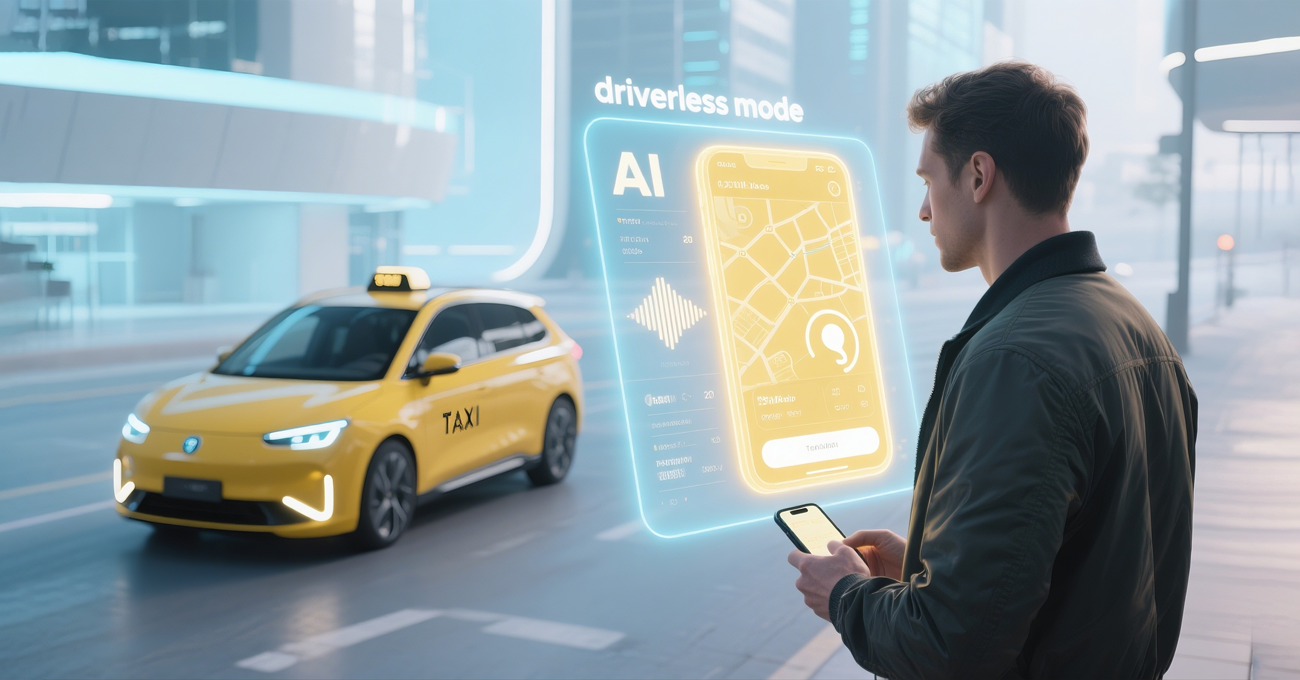Artificial Intelligence has transitioned from futuristic speculation to an essential pillar of the modern tech industry. AI has become the driving force to revolutionize numerous sectors, including Transportation, particularly the taxi sector. AI plays an important role in the significant improvement from operational efficiency to customer satisfaction.
This blog comprehensively outlines how AI can change the Taxi industry services. From autonomous vehicles to customized mobile apps, artificial intelligence is making transportation safer and more efficient, benefiting everyone involved, from drivers and passengers to fleet operators and city planners.
- Existing Challenges in the Taxi Sector
- How AI Can Change the Taxi Industry
- Taxi App Development Through AI
- Improving Passenger Safety and Driver Assistance
- AI in the Taxi Industry
- Environmental Benefits of AI
- Economic Impact and Operational Efficiency
- AI's Role in Enhancing User Experience
- Human-AI Collaboration: The Future of Work in the Taxi Industry
- Case Studies and Real-World Implementations
- Future Innovations and Trends
- Conclusion
Existing Challenges in the Taxi Sector
Operational Inefficiency
Traditional taxi dispatching methods are often inefficient, which results in increased wait times and wastage of resources.
Safety and Compliance
Ensuring passenger and driver safety, alongside compliance with strict regulations, poses continuous challenges.
Environmental Impact
The industry's reliance on fuel-powered vehicles significantly contributes to carbon emissions, increases pollution, and raises environmental concerns.
How AI Can Change the Taxi Industry
Incorporating AI means faster service, reduced costs, and happier customers. AI-powered solutions enable smarter dispatch, predictive vehicle maintenance, and enhance passenger safety.
AI-driven Route Optimization
The integration of AI into the taxi sector plays an important role in reducing operational inefficiencies. Artificial intelligence improves overall efficiency by optimizing the routes through advanced predictive analysis and real-time data processing and management.
Key Benefits Include:
- Reduced Travel Times: AI can change the taxi industry through accurate algorithms, predicting traffic patterns and helping drivers to avoid congested areas. The intelligent route suggestions help in reducing the overall travel time.
- Cost Savings: Reduced fuel consumption from optimized routes lowers operational expenses and increases efficiency and profit.
- Enhanced Passenger Experience: The increased reliability and faster service directly impacts passenger satisfaction.
Related Article: Importance of Transport System in Modern Transportation Sector
The Emergence Autonomous Vehicles
The artificial intelligence-based autonomous vehicles, which are commonly known as robo taxis, represent a revolutionary step forward in urban transportation of the world. Companies like Tesla and Waymo introduce robot taxis that are tech-driven, sophisticated AI-based systems. The emergence of these vehicles has these effects on transportation:
- Enhanced Safety: AI makes decisions through advanced sensors and machine learning algorithms that reduce the possible human errors and improve the safety of both drivers and passengers.
- Operational Efficiency: Eliminating driver-related expenses from substantially lower operating costs, allowing for competitive pricing and improved profit margins.
- Impact on Employment: While these auto taxis present opportunities, they also raise some challenges, including potential job displacement, which highlights the need for strategic human-AI collaboration.
Taxi App Development Through AI

The advanced taxi apps and dispatch solutions (like Cabsoluit) are based on artificial intelligence. The application of AI technology creates smarter systems and more intuitive user interfaces that streamline the whole service, through which AI can change the taxi industry very fastly.
Intelligent Booking Systems
Taxi Apps based on AI use predictive analysis to anticipate the user needs better, improving bookings and on-demand services.
Dynamic Pricing Models
AI algorithms help in adjusting pricing, based on real-time user demand and supply, indirectly optimize revenues while ensuring fairness for both customer and drivers.
Analytics-Driven Customer Satisfaction
Through the analysis of user data, AI customizes the ride experience of the passenger, boosting satisfaction and helping retain loyal customers.
Improving Passenger Safety and Driver Assistance
AI isn’t just improving the user experience; it’s also prioritizing the safety of the passenger and for the students if you are providing school run services and driver by:
Driver Monitoring Systems
AI tracks driver behavior in real-time, detecting fatigue, distraction, or unsafe driving, and alerts drivers to take necessary breaks. It also helps in surveillance.
Real-Time Feedback Loops
AI feedback also helps drivers improve their performance, making roads safer for travelling.
Smart Navigation
With the smart navigation and optimization of routes through AI passengers can expect quicker, safer trips.
AI in the Taxi Industry
Artificial intelligence involves computer systems that are capable of performing tasks with human-like intelligence through data analysis and decision-making. The core components of artificial intelligence include machine learning and neural networks that enable the system to recognize and learn patterns.
It also analyzes the data to make informed decisions and improve its functionality. The taxi industry is adopting AI technologies rapidly to transform traditional operations into highly advanced intelligent systems that enhance the quality and efficiency of its operational services.
The collaboration between Artificial Intelligence and the taxi sector brings outstanding changes in the industry, and it also affects drivers, passengers, fleet managers, and even city planners.
To improve the overall efficiency of the taxi industry and modernize transportation for everyone, adopting AI has become very crucial. Dispatch systems are also integrating AI for managing small and large fleet businesses.
Environmental Benefits of AI
Electric Vehicles (EVs)
AI helps manage EV fleets efficiently (e.g. Leeds Cab , the only taxi service in Leeds with zero-emission taxis), thus reducing dependency on traditional fuels and supporting green energy goals.
Carbon Footprint Reduction
By calculating the best routes, AI helps taxis cut down emissions and reduce air pollution, aligning with global sustainability goals and objectives.
Smart City Contributions
AI-powered taxis also collaborate with smart city initiatives, improving overall urban mobility and environmental control.
Economic Impact and Operational Efficiency
Data-Driven Optimization
By analyzing and managing large data, AI helps taxi owners manage fleets better and cut operational costs.
KPI-driven Analytics
Performance based metrics derived from AI insights and data help improve decision-making, which leads to better profitability.
Business Scalability
AI allows flexible scaling that enables businesses to adjust to varying market demands and also helps to control operations better.
AI's Role in Enhancing User Experience
AI-Powered Chatbots
With AI-driven chatbots, customer support becomes more efficient, ensuring no query goes unanswered 24/7.
Personalized Experiences
AI recognizes customer preferences through the existing saved record and tailors the ride experience, offering greater convenience.
Seamless Mobility Platforms
AI offers integrated solution for booking and travel processes making them smoother and less time taking and proving hassle-free experience for the passengers.
Human-AI Collaboration: The Future of Work in the Taxi Industry
Employment Opportunities
As AI becomes more integrated into operations, new roles emerge in AI system management, data labeling, and analytics to support the growing infrastructure of AI.
Dispatch Operations
AI also automates routine tasks, freeing up human operators and focusing on more complex decision-making. This improves the overall dispatch process.
Collaborative Driver Assistance
AI tools will work alongside drivers, reducing their stress and supporting them in real-time and increasing job satisfaction.
Case Studies and Real-World Implementations
Cabsoluit Smart Dispatch Solution
Cabsoluit's dynamic pricing and mobility optimization have revolutionized the way we think about ride-hailing.
Tesla's Autonomous Innovations
Tesla is leading the charge in autonomous vehicle development, especially when it comes to developing robot-taxis.
Smart Cities
The smart cities around the world are already seeing improved efficiency and sustainability through the integration of AI in their taxi systems.
Future Innovations and Trends
Further Autonomous Taxi Integration
As autonomous technology advancement and public trust grows, we can expect more widespread adoption of self-driving taxis.
Advanced Traffic Management Systems
AI’s predictive capabilities will further optimize urban mobility, making cities smarter and more efficient through advanced traffic management systems.
Innovative Smart Taxi Solutions
The future will bring even more sustainable, safer, and user-friendly taxi services driven by AI innovations.
Conclusion
AI is transforming the taxi industry, offering groundbreaking improvements in convenience, safety, customer experience, and sustainability. Embracing these AI driven technologies has now become crucial for taxi operators, city planners, and regulators to stay ahead of the curve and meet the needs of the future and to build sustainable transport systems for everyone involved.




